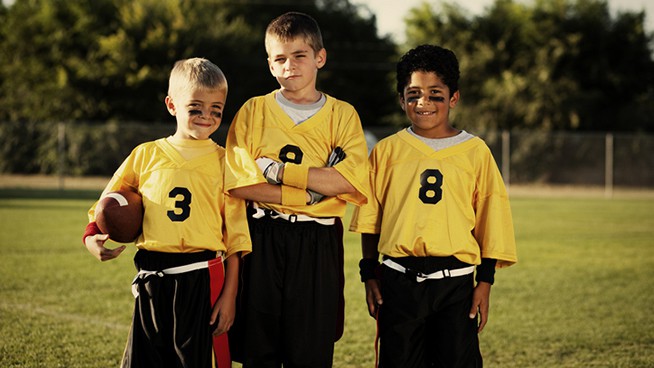Study: Football Hits Cause Brain Changes, Even Without Concussion

Source: NASA
A new study by the Cleveland Clinic found that blows to the head can lead to measurable and lasting changes in the brain—even when those hits do not cause concussions.
Researchers set out to examine the consequences of “sub-concussive events,” or the type of head hits football players experience hundreds of times per season during normal play. They monitored 67 collegiate football players in Ohio and New York, taking blood samples before and after games and at the beginning and end of the season. They also analyzed game film and administered questionnaires after games to see which players experienced the hardest hits.
The result? Players who took hits to the head below the threshold of a concussion had elevated levels of S100B in their bloodstreams. S100B is a protein considered an indicator of damage to the blood-brain barrier, the brain’s protective lining. Players who took the most hits had the highest levels of S100B in their bloodstreams.
The body responds to significantly elevated levels of S100B by releasing antibodies to attack it, misidentifying the protein as an invader, Researchers believe those auto-antibodies can harm the brain if they get through its protective barrier, which is possible after a blow to the head has damaged it. They also tracked the presence of those auto-antibodies and found a correlation between elevated auto-antibody levels and problems with impulse control.
Researchers also observed that brain changes caused by head hits lasted as long as six months.
“This is a very strong study to suggest that you don’t have to have any recognized concussions to have brain dysfunction,” Boston University neurosurgeon Dr. Robert Cantu told Cleveland’s daily newspaper, The Plain Dealer. Cantu is a leading researcher of brain injuries. He was not involved with the Clinic study, but he did review it.
“The big message is that those [football players] who are taking 1,000, 1,500 hits over the course of a season, a significant number of them may be taking some brain abnormalities as a result of it,” Cantu said. “This is giving parents food for thought about the concept that no trauma is good for the brain.”
Cantu and others spoke with Plain Dealer reporter John Mangels in his report on the new study, which you can read here.
[Plain Dealer]RECOMMENDED FOR YOU
MOST POPULAR
Study: Football Hits Cause Brain Changes, Even Without Concussion

Source: NASA
A new study by the Cleveland Clinic found that blows to the head can lead to measurable and lasting changes in the brain—even when those hits do not cause concussions.
Researchers set out to examine the consequences of “sub-concussive events,” or the type of head hits football players experience hundreds of times per season during normal play. They monitored 67 collegiate football players in Ohio and New York, taking blood samples before and after games and at the beginning and end of the season. They also analyzed game film and administered questionnaires after games to see which players experienced the hardest hits.
The result? Players who took hits to the head below the threshold of a concussion had elevated levels of S100B in their bloodstreams. S100B is a protein considered an indicator of damage to the blood-brain barrier, the brain’s protective lining. Players who took the most hits had the highest levels of S100B in their bloodstreams.
The body responds to significantly elevated levels of S100B by releasing antibodies to attack it, misidentifying the protein as an invader, Researchers believe those auto-antibodies can harm the brain if they get through its protective barrier, which is possible after a blow to the head has damaged it. They also tracked the presence of those auto-antibodies and found a correlation between elevated auto-antibody levels and problems with impulse control.
Researchers also observed that brain changes caused by head hits lasted as long as six months.
“This is a very strong study to suggest that you don’t have to have any recognized concussions to have brain dysfunction,” Boston University neurosurgeon Dr. Robert Cantu told Cleveland’s daily newspaper, The Plain Dealer. Cantu is a leading researcher of brain injuries. He was not involved with the Clinic study, but he did review it.
“The big message is that those [football players] who are taking 1,000, 1,500 hits over the course of a season, a significant number of them may be taking some brain abnormalities as a result of it,” Cantu said. “This is giving parents food for thought about the concept that no trauma is good for the brain.”
Cantu and others spoke with Plain Dealer reporter John Mangels in his report on the new study, which you can read here.
[Plain Dealer]










